Reading Time: 13 Min
Most rhinoplasty patients get increasingly nervous as they approach the surgery appointment. Although this is normal, the more the patient be informed about and prepared for the surgery, the less anxiety he/she will have before the appointment.
This guide provides all the rhinoplasty preparation tips and instructions you should follow before rhinoplasty surgery. This way, everything will go as smoothly as possible and you will have a successful nose job. At the end of this post, you will know everything from rhinoplasty pre-op tests to your diet before rhinoplasty.
Key points you should know before the surgery
- Before anything else, your doctor will ask about your medical history and any medicines you take.
- Your doctor or his or her assistant will capture high-quality images of your nose from 8 different angles in a medical portrait studio.
- Your surgeon will make a thorough assessment of your health to make sure that you are eligible for the surgery.
- If your doctor finds it necessary, s/he will ask you to undergo a CT scan.
- You will need to avoid taking aspirin, ibuprofen (Advil, Motrin), naproxen (Aleve), vitamin E, contraceptive pills, and even herbal supplements. Let your doctor know if you are using any medicines or supplements.
- You should avoid smoking and keep any type of nicotine at bay two weeks before rhinoplasty.
- You must not eat and drink anything, including water, for at least 10 hours before the surgery.
- You must not wear any make-up, nail polish, and hair product and you need to remove your jewelry before going to the operating room.
- It is recommended to take a shower before heading to the hospital.
- Make sure to bring your passport, ID card, medical images, lab results, and other documents with you to the hospital.
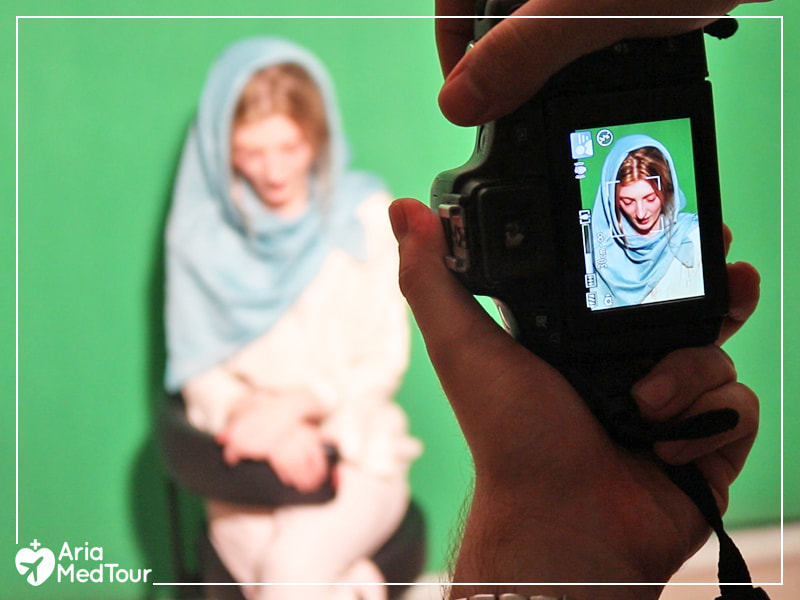
Before your nose surgery, you will be photographed and your nose will be examined by your doctor.
Getting ready for nose surgery
We understand how excited — and anxious — you are as you get closer and closer to the day of your surgery. This is a natural feeling as rhinoplasty has a dramatic influence on your facial beauty for a lifetime.
To get fully prepared for the surgery, we invite you to take some time and read this post to the end.
Pre-op consultation and examination
Your surgeon wants to know about your health condition to make sure you are ready for rhinoplasty.
During the pre-op visit, your doctor gathers all the information on your medical history, including a history of nasal obstruction, surgeries, and any diseases you may have. For example, patients with bleeding disorders, namely hemophilia, are not good candidates for the nose job.
– Physical exam
Physical examination is a significant rhinoplasty preparation step that directly affects your surgery’s outcome.
During the physical examination, your doctor checks your nasal valves, nasal skin, bony and cartilaginous irregularities, the thickness of your skin, and nasal sebaceous glands.
Besides, your conventional way of breathing is examined to see whether you are breathing through nose or mouth. Such pre-op examinations help the surgeon to prepare the right surgical plan.
Your doctor gathers this through palpation and visual analysis. Your height, weight, and blood pressure are among the necessary pre-op examinations for rhinoplasty.
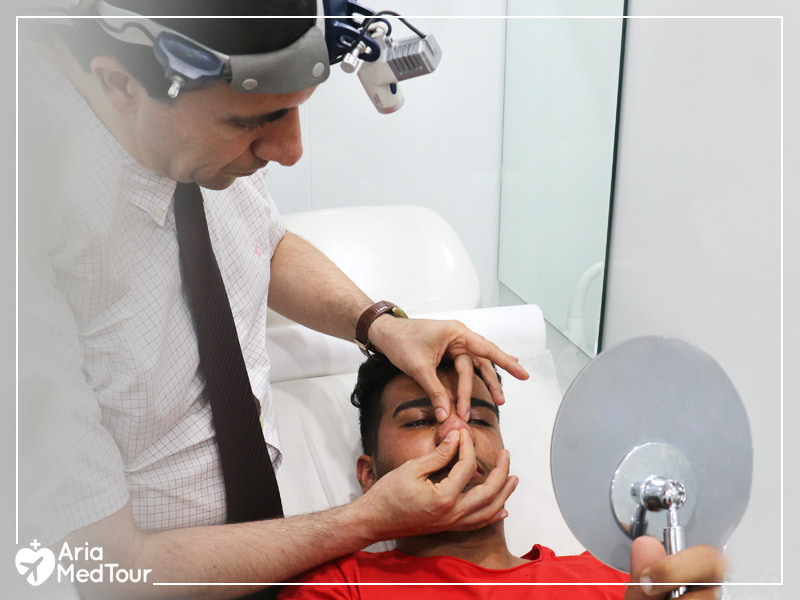
Your doctor evaluates you and your nose condition through palpation and visual examination.
– Medical photography
Your doctor or his or her assistant captures high-quality images of your nose from different angles in a medical portrait studio. These photos help with post-operative assessments and the shots might be required during the surgery to better understand the nasal shape and the desired results.
An assistant will take eight photos from different angles, including:
- Anterior view
- Right lateral view
- Right oblique view
- Left lateral view
- Left oblique view
- Basal view
- Cephalic view
- Profile view with a smile
Keep in mind to avoid wearing any make-ups or glasses when taking photos as they affect the final shots.
To predict the final possible results, your doctor may manipulate the medical photos using a computer. You can also discuss your concerns and desired results during the session.
Never skip preoperative consultation session before rhinoplasty. Discuss your concerns and expectations with your surgeon. If you are suffering from a problem with the function of your nose, including deviated septum or breathing problems, tell him/her before the surgery.
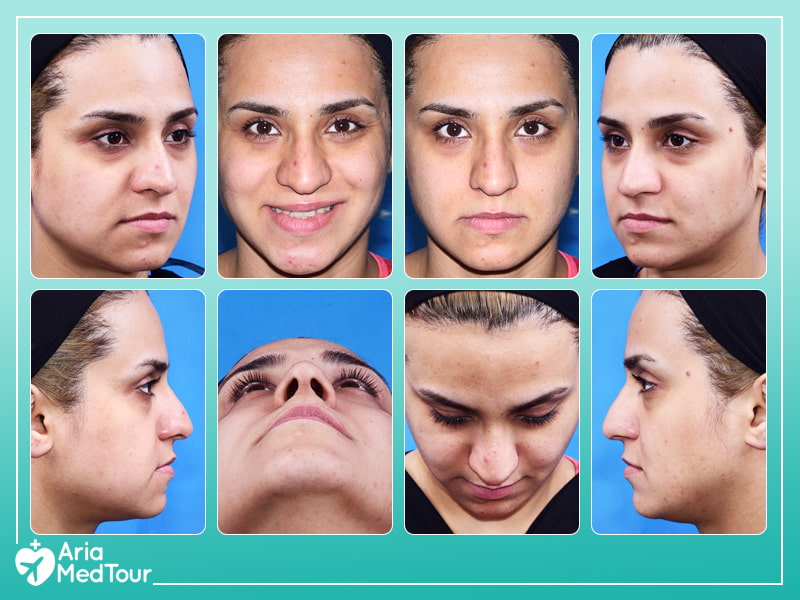
Your doctor or his or her assistant captures high-quality images of your nose from different angles before surgery.
– Pre-op tests for rhinoplasty
There is a set of tests and checkups that need to be done before a nose job surgery. During the pre-op appointment with your surgeon, he/she will ask you to take the necessary tests.
+ Blood test
The blood test is a routine pre-op test done before rhinoplasty and it takes just 20 minutes. It is performed simply by drawing a small sample of blood from a vein in your arm using a needle.
Using the results of your lab work, your doctor checks if you have any infection, anemia, or blood-clotting disorder. The metrics examined in your blood experiment include:
- FBS to check the level of your blood sugar
- CBC.diff to diagnose anemia
- PT & PTT to prevent any unexplained bleeding or inappropriate blood clots
- HIV
- Hepatitis
Nose Job Packages
Surgery + Hotel + Visa
Transfer + Interpreter
+ Other exams your doctor may prescribe you to take
Based on the result of your blood test and your general health state, you may require additional pre-op tests. Your doctor may prescribe an X-ray test for checking your lungs and ECG for checking your heart.
- Electrocardiography (EGC)
ECG is a medical test that shows your heart rate. The test is for patients who are above 40 years old. EGC determines if you have experienced any heart attack without knowing it. It also gives information about the threshold a patient can bear the stress caused by the surgery.
- β-HCG (pregnancy test)
Β-HCG or pregnancy test is for women who suspect they are pregnant before undergoing nose surgery. The surgeons usually postpone the procedure if you are pregnant.
- Chest X-ray
X-ray test is for those who smoke or have respiratory ailments. The test gives your doctor information about the condition of your lungs and how your lungs react to anesthesia.
Patients suffering from pneumonia or respiratory disorders may end up with a delay or cancelation of the surgery.
- CT-Scan
Given your condition and the purpose of your surgery, your doctor may want to check the inside of your nose using a CT scan.
Thanks to such advanced CT-Scan photography, your doctor could detect if you are suffering from any infection sinus, polyp, or deviation of septum before the surgery. In most cases, your doctor treats the nasal problems with cosmetic nose surgery simultaneously.
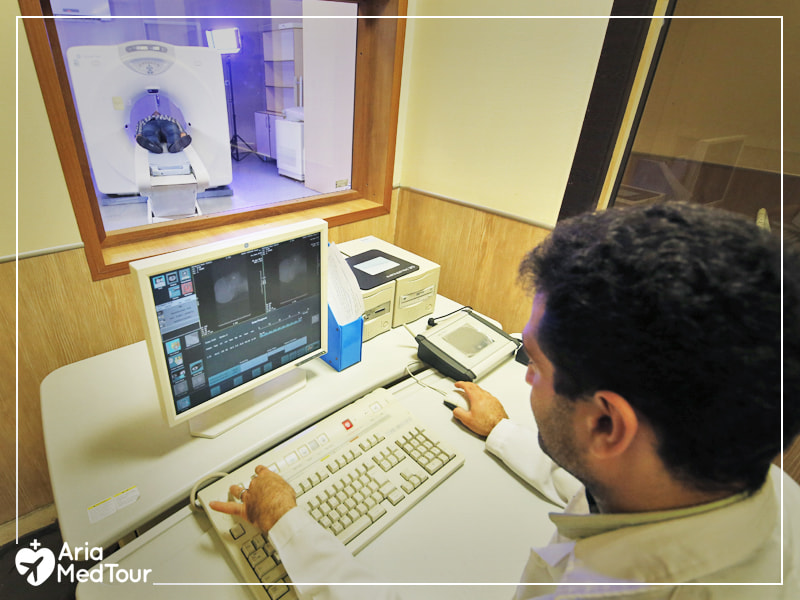
In certain cases, your doctor may prescribe you to take CT-scan prior to the surgery’s appointment.
– Psychological examination
According to the American Society of Aesthetic Plastic Surgery (ASAPS), psychological evaluation before cosmetic surgeries, including rhinoplasty, is sharply critical for patients who may be too obsessive about their appearance.
For example, some people exaggerate the flaws in their physical appearance. They usually overstate any minor or non-existent problem about themselves. In most instances, they have already undergone several cosmetic surgeries with different surgeons. In such situations, a psychological evaluation can help the individual accept his/her appearance without having to undergo any surgical interventions.
Rhinoplasty preparation tips that you should follow
In addition to the above mentioned examinations, there is a set of rhinoplasty preparation tips that help you to experience a better procedure and see the best results. Read on and learn all you need to do before heading to the hospital.
Don’t take aspirin, ibuprofen, and vitamin E!
Two weeks before the rhinoplasty, you should avoid taking certain medications such as aspirin, ibuprofen (Advil, Motrin), naproxen (Aleve), and other non-steroidal anti-inflammatory drugs, as well as vitamin E, because they may lead to excessive bleeding during the operation.
You should also stop using herbal supplements and fish oil. These kinds of medications are blood-thinning and will cause excessive bleeding during the surgery. You are only allowed to take medicines prescribed by your doctor.
Stop smoking 2-3 weeks before the surgery
It does not matter if you smoke or you are frequently exposed to second-hand smoke. Nicotine leads to serious complications during the procedure.
With smoking, carbon dioxide negatively affects your vessels and nicotine restrains the amount of oxygen to reach different parts of your body. It could result in some complications during the surgery and delayed or improper healing.
Skin loss, scarring, anesthesia risks, and even infection are among the other side effects of nicotine. To avoid such problems, your doctor may advise you to stop smoking 2 or 3 weeks before rhinoplasty. As a rule of thumb, the more time you avoid nicotine before surgery, the better results you will get.
- Also Read: Is it OK to smoke after rhinoplasty?
Stop drinking alcohol 2 weeks before the surgery
Just like smoking, alcohol exerts detrimental effects on the safety of the rhinoplasty. It would be better to stop drinking alcohol at least one week before the surgery. The longer, the better.
Drinking alcohol before the rhinoplasty could result in serious complications. Alcohol also thins your blood and could potentially breed problems during the surgery, such as anesthesia risks or uncontrolled excessive bleeding.
Increase your protein intake
Your diet before rhinoplasty is very important and should be taken seriously as you are getting prepared for the surgery.
It is highly recommended to start eating foods highly rich in protein, such as eggs, meat, soy, and chicken at least 3 weeks before the surgery. Protein speeds up the healing process and helps patients to overcome the trauma of surgery.
Don’t eat or drink anything before the surgery
Your surgeon will probably ask you to be fasting when visiting the hospital for surgery. Typically, you’ll be asked not to eat or drink anything from after midnight before the surgery because you would have a safer surgery with an empty stomach. This is because, during the anesthesia, your body cannot prevent the contents of your stomach from entering the lungs, causing breathing problems for you.
Take a shower the night before your nose surgery
Having a shower the night before surgery reduces the risk of infection during the operation. For taking a shower, use antiseptic or other recommended soap to rid your skin of any bugs or bacteria. Make sure you do not use any perfumes, lotions, and cream after the shower.
Shave your skin two or three days before the surgery
Avoid shaving your skin a day before the surgery. Do it at least two days before rhinoplasty to prevent surgical site infection.
Shaving could damage your skin at a microscopic level. It causes tiny wounds on your skin that are channels where bacteria could grow and cause infection during the surgery. So, make sure you have shaved the surgical site (the mustache for men) two or three days before the procedure.
Do not use makeup and jewelry
Heading to hospital, you should not be wearing any make-up, nail polish and hair product. Otherwise, your doctor may be misled about detecting hypoxemia (low level of oxygen in the blood.)
Furthermore, remove all your jewelry and contact lenses before the operation as they are breeding ground for bacteria, and they could cause infection during the surgery.
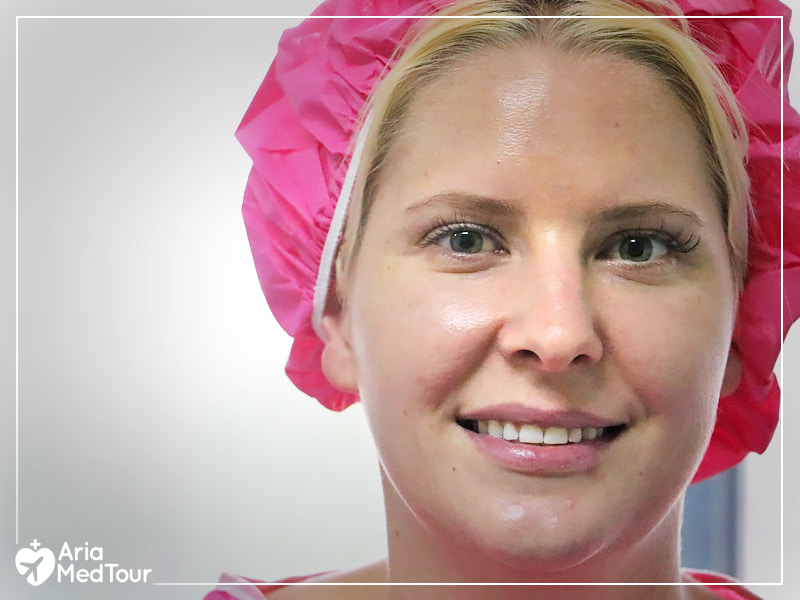
Getting ready for the surgery is an important step you shouldn’t ignore!
Be cautious of your allergies
It may be wise to postpone your rhinoplasty if you are suffering from seasonal allergy. People suffering from such allergies usually end up experiencing difficulties in the healing process and postoperative care.
If you are suffering from seasonal allergy, consult with your doctor to schedule another date when your allergy symptoms are not severe.
- Also Read: how to get mentally prepared for nose surgery?
Make arrangements in advance
After the surgery, you are not allowed to drive or leave alone. Therefore, you need to make the necessary arrangements in advance.
If you are traveling abroad for rhinoplasty, make sure to book your hotel, doctor’s appointment, and flight beforehand. If you get your nose job surgery organized by AriaMedTour, we’ll make all the arrangements for you, from picking you from the airport to 24/7 support before and after your surgery.
We have provided you with some rhinoplasty preparation tips and things you should know to prepare for the surgery. For a smooth surgery, however, patients are recommended to learn as much as possible about every aspect of a nose surgery.
Getting advice from people who have had the same surgery can also be of great help. The more informed you are about rhinoplasty, the less anxiety you will have before the surgery. Finally, strictly following your surgeon’s instructions both before and after surgery is vital to a successful nose job
If you have other questions not covered in this post, do not hesitate to contact us.
Share this article:
You May Like to See Before & After Photos of Rhinoplasty
You May Like to See Before & After Photos of Rhinoplasty
Related Articles
Feel free to express your opinions or ask your questions regarding the article

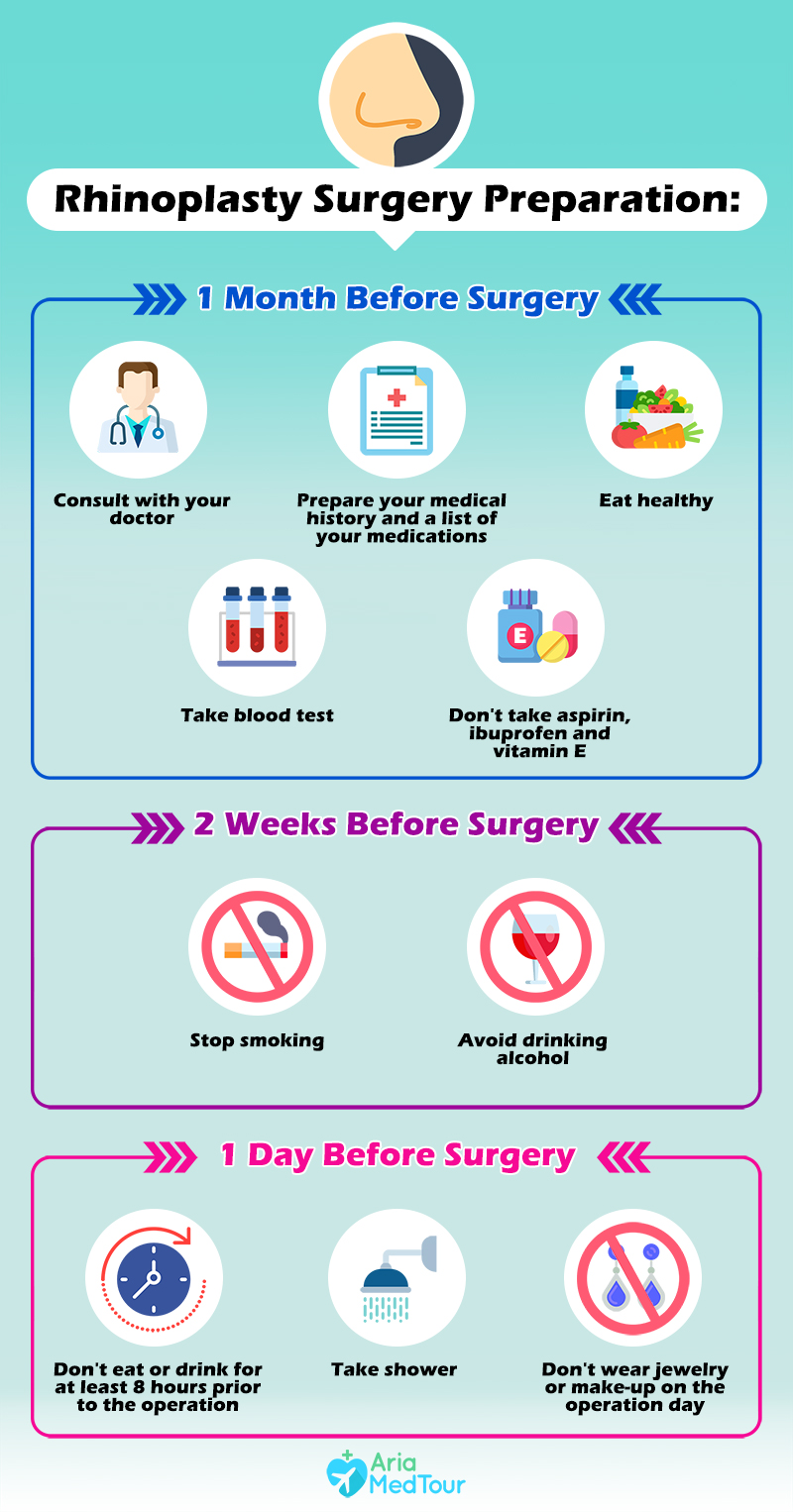

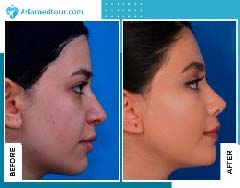
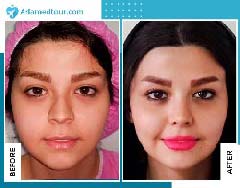
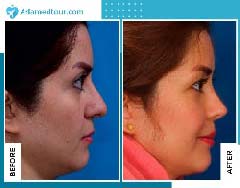
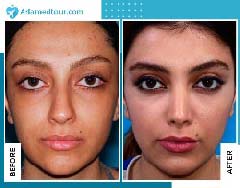
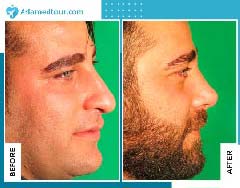
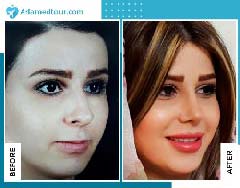
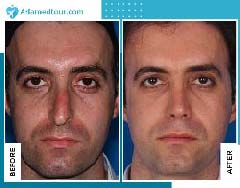
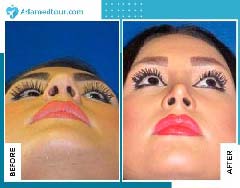
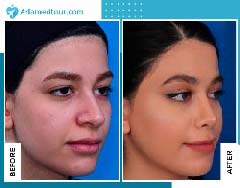
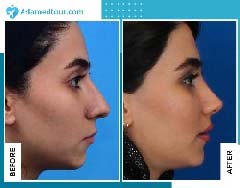



When & How Can I Wear Makeup After Rhinoplasty?
Skin Care After Rhinoplasty
Risks and Potential Complications of Rhinoplasty
How to Clean My Nose After Rhinoplasty?
How to Choose the Best Rhinoplasty Surgeon?